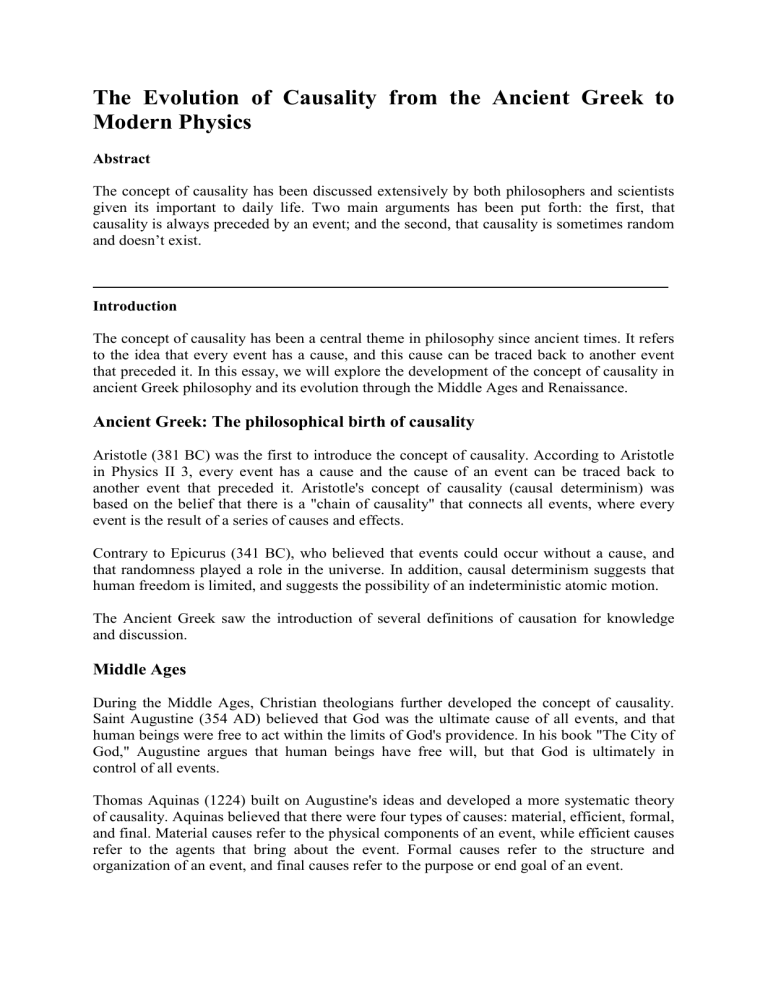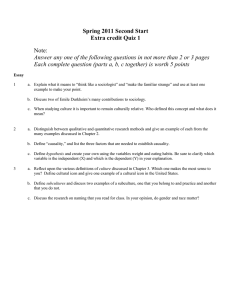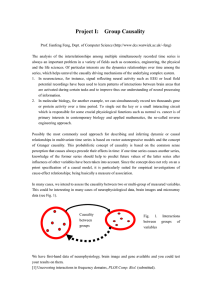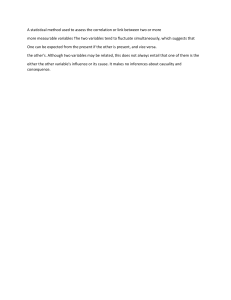
The Evolution of Causality from the Ancient Greek to Modern Physics Abstract The concept of causality has been discussed extensively by both philosophers and scientists given its important to daily life. Two main arguments has been put forth: the first, that causality is always preceded by an event; and the second, that causality is sometimes random and doesn’t exist. Introduction The concept of causality has been a central theme in philosophy since ancient times. It refers to the idea that every event has a cause, and this cause can be traced back to another event that preceded it. In this essay, we will explore the development of the concept of causality in ancient Greek philosophy and its evolution through the Middle Ages and Renaissance. Ancient Greek: The philosophical birth of causality Aristotle (381 BC) was the first to introduce the concept of causality. According to Aristotle in Physics II 3, every event has a cause and the cause of an event can be traced back to another event that preceded it. Aristotle's concept of causality (causal determinism) was based on the belief that there is a "chain of causality" that connects all events, where every event is the result of a series of causes and effects. Contrary to Epicurus (341 BC), who believed that events could occur without a cause, and that randomness played a role in the universe. In addition, causal determinism suggests that human freedom is limited, and suggests the possibility of an indeterministic atomic motion. The Ancient Greek saw the introduction of several definitions of causation for knowledge and discussion. Middle Ages During the Middle Ages, Christian theologians further developed the concept of causality. Saint Augustine (354 AD) believed that God was the ultimate cause of all events, and that human beings were free to act within the limits of God's providence. In his book "The City of God," Augustine argues that human beings have free will, but that God is ultimately in control of all events. Thomas Aquinas (1224) built on Augustine's ideas and developed a more systematic theory of causality. Aquinas believed that there were four types of causes: material, efficient, formal, and final. Material causes refer to the physical components of an event, while efficient causes refer to the agents that bring about the event. Formal causes refer to the structure and organization of an event, and final causes refer to the purpose or end goal of an event. Aquinas's theory of causality has been influential in both philosophy and science. In philosophy, his theory has been used to explain the relationship between God and the natural world. In science, his theory has been used to explain the causes of physical events. For example, in his book "Summa Theologica," Aquinas uses his theory of causality to explain the existence of the natural world. He argues that the material cause of the natural world is God, who created the world out of nothing. The efficient cause of the natural world is God, who sustains the world in existence. The formal cause of the natural world is the order and structure of the world, which reflects the order and structure of God's mind. The final cause of the natural world is the end goal of the world, which is to glorify God. The Middle Ages saw the development of a more systematic theory of causality with relation to religion, which has had a lasting impact on both fields. Renaissance Bacon (1561) believed that causality could only be established through empirical observation and experimentation, emphasising the importance of collecting data, making observations and testing hypotheses systematically to understand the underlying causes of events as seen in his book "Novum Organum". Descartes (1596), on the other hand, believed that causality could be understood through reason alone, arguing that the mind and body were separate entities. In "Meditations on First Philosophy", he argued that the mind had the ability to understand the causes of events through introspection and deduction. Locke (1632) believed that causality was a necessary connection between events, and that this connection was a fundamental part of human knowledge. He argued that the mind was a blank slate at birth, and that knowledge was acquired through experience. In his book "An Essay Concerning Human Understanding," Locke argued that the idea of causality was derived from the observation that certain events always followed other events in a predictable manner. Modern Philosophy David Hume (1711) argued that causality is a product of human imagination and that there is no necessary connection between cause and effect. Immanuel Kant's (1724) view on causality was that it was a necessary condition for experience of the world. In his Critique of Pure Reason, he argued that the mind must impose the concept of causality on the world in order to make sense of it. According to Kant, causality is not a property of the external world, but rather a category of the mind that is necessary for the mind to organize and understand sensory information. In Relation to Science The concept of causality has been a fundamental part of the scientific method. However, not all scientific theories or laws have required the use of causality – many scientists find it difficult to prove the existence of causality. Classical Physics Isaac Newton, for example, believed that every event had a cause and that it was possible to understand the causes of events through observation and experimentation. Newton's laws of motion were based on the concept of causality and had a significant impact on the development of physics. Specifically, Albert Einstein’s theory of special and general relativity suggests that cause and its effect are separated by a time-like interval, and the effect belongs to the future of its cause. The word causality in this context means that all effects must have specific physical causes due to fundamental interactions. Causality in this context is not associated with definitional principles such as Newton’s 2nd Law As such, in the context of causality, a force does not cause a mass to accelerate nor vice versa. 𝑑2 𝑟 𝑚1 𝑚2 𝐺(𝑟1 − 𝑟2 ) |𝑟1 − 𝑟2 |3 𝑑2 𝑟 𝑚1 𝑚2 𝐺(𝑟2 − 𝑟1 ) |𝑟2 − 𝑟1 |3 𝑚1 𝑑𝑡 21 = − 𝑚2 𝑑𝑡 22 = − The two coupled equations describe a process of interaction between the two bodies, without any necessity to interpret one body as the cause of the motion of the other. In situations where humans identified factors in a physical interaction as “prior”, they often include some state of affairs in which humans directed their energies to producing the said state of affairs — a process that took time to establish and often leaving a new state of affairs. Conclusion In conclusion, the concept of causality has been a central theme in philosophy since ancient times. From Aristotle's "chain of causality" to Aquinas's four causes, and from Bacon's emphasis on empirical observation to Descartes's emphasis on reason, the concept of causality has evolved and been refined over the centuries. Today, the concept of causality remains an important topic of discussion in philosophy, science, and everyday life. While the laws of quantum mechanics will eventually challenge our understanding of causality, the concept continues to be a fundamental part of our understanding of the world. Word Count: 1,182 Notes from Prof: 1. Explain the evolution across periods, 2. Maybe just compare one or two periods – focus on the analysis For future dive: 1. Dive deeper into causality with regards to the equation, especially when it comes to quantum physics 2. Quantum theory is all about measurement – measurement theory 3. How measurements is tied to causality




